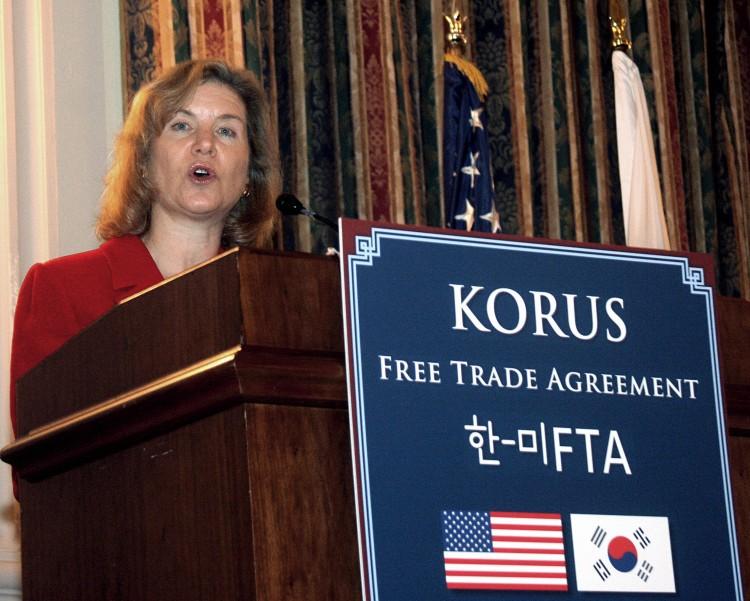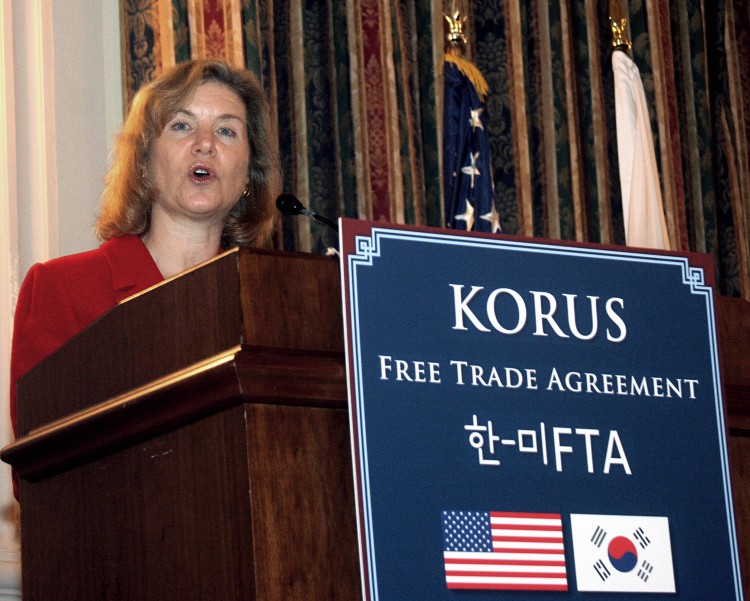The Korea-United States Free Trade Agreement (KORUS FTA) will take effect on March 15, signifying the most monumental step for American exports since the North American Free Trade Agreement (NAFTA). But the bipartisan-supported, comprehensive trade agreement may only scratch the surface of rudimentary issues.
“It is the most important trade legislation since NAFTA agreement in 1994,” said Neal Asbury, president of The Legacy Companies, a leading global distributor of quality food-service equipment.
KORUS FTA will cover various non-tariff problems such as environmental standards, customs administration, and intellectual property rights, according to the United States Trade Representative (USTR).
Asbury concurs the agreement “covers all of the aspects of the trade relationship,” serving as a model “template that should be used with more trade partners.”
“It’s our best deal yet,” he said.
According to Asbury, the U.S deficit resides with countries like China, India, Brazil, and Japan, and similar agreements should be made with those countries particularity. “My only regret is that we haven’t done the same thing with where our real problems are,” he said.
Under the KORUS FTA, Korea must effectively enforce fair labor laws that allow American workers to compete.
The agreement changes almost 80 percent of U.S. industrial exports, and two-thirds of U.S agricultural exports to Korea as duty-free. It opens up “Korea’s $1 trillion economy for America’s workers,” United States Trade Representative Ambassador Ron Kirk said in a statement.
The U.S. International Trade Commission (ITC) estimates the reduction of Korean tariffs on goods will add $10 billion–12 billion annually for the U.S. Gross Domestic Product.
More Higher Paying Jobs
“In a few short weeks ... tens of thousands of export-supported jobs with better wages – will start to come home for American businesses and working families,” stated Ambassador Kirk.
The White House believes the ability to create jobs relies on the ability to export goods and services. In 2010, exports supported an estimated 9.2 million American jobs, all “positions that pay well,” the White House claims. “Americans whose jobs are supported by goods exports earn 13 to 18 percent more than the national average.”
The U.S. International Trade Commission (ITC) estimates the tariff cuts alone can increase exports by $10 billion–$11 billion, creating and sustaining 70,000 export-related jobs.
According to ITC jobs will be created more in technological areas such as machinery, electronics, transportation, and medical devices, due to tariff eliminations of already existing trade flows. But for sectors with little pre-existing trade, the job flow may not be much.
For the farming industry, there are “relatively small increases in output and employment for agriculture ... with the largest increase as 2 percent for the meat sector,” ITC states.
American Manufacturing Trade Action Coalition (AMTAC) says it is impractical for some to export products to travel “several thousand miles across the Pacific Ocean to a market where our competitors in China and Japan are right next door.”
KORUS FTA May Hurt Textile Industry
“The U.S. textile industry is worried,” said Ruth Stephens, executive director of U.S. Industrial Fabrics Institute (USIFI).
“We oppose it because it is not truly a zero for zero market opening,” said David Trumbull, vice president of International Trade at National Textile Association. “We don’t ship that much over there, and the 10 percent added value tax will help even less.”
South Korean textile exports will enter duty-free under KORUS FTA, while South Korea continues to charge U.S exports a 10 percent Value Added Tax (VAT).
“Also, their phase out schedule is not fairly balanced,” Trumbull said. “The U.S. goes to zero quickly on almost everything, while South Korea will have a longer phase out over a number of items of interest.”
“It’s not a reciprocal agreement,” he said.
According to the American Manufacturing Trade Action Coalition (AMTAC), in “almost every free trade agreement (FTA) of the United States: our FTA partners sell more to us than we to them.”
Fundamental Issues Unresolved
Although KORUS FTA addresses various issues, the changes were “small and not the critics’ central concerns,” said Todd Tucker, research director of Public Citizen’s Global Trade Watch.
The biggest concern was over the growth of the investors-state system, an issue that existed since NAFTA. According to Tucker, the issue involves allowing corporations to challenge the regulations of another country.
This brings “serious threats to our environmental policy, financial regulation, and other consumer policies,” Tucker said.
According to Chandler Goule, vice president of government relations for National Farmers Union, the issues the agreement address do not fix anything in essence. “When it comes to environmental issues and international labor standards, one of our major concerns is that ”the national products are ruled by a 35 percent threshold,” he said.
“You can assemble something in South Korea, but only 35 percent of the raw materials had to come from South Korea to be labeled as a South Korean product,” Goule explains. He indicates the rule will lead to humanitarian violations by South Korea’s neighboring countries, where manufacturing parts may be coming from. Labor law violators of “those countries will still be supported by U.S. dollars.”
KORUS FTA creates both “winners and losers,” Goule said.
The Economic Policy Institute (EPI) estimates that trade deficits “are likely to displace 159,000 U.S. jobs in the first seven years.”






